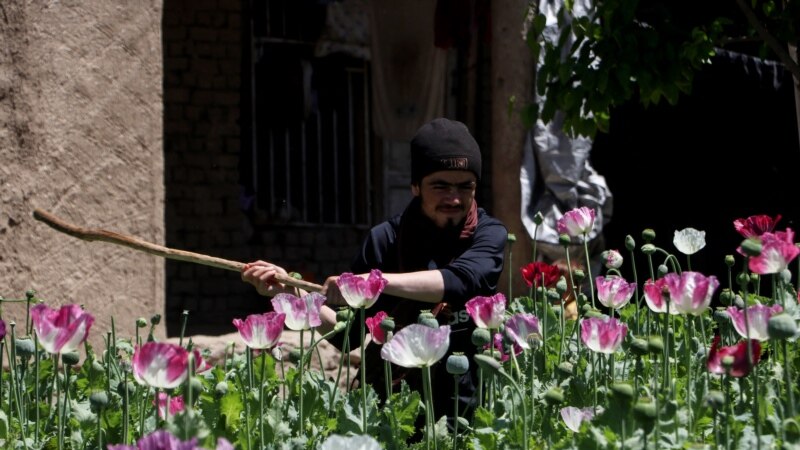Taliban lament lack of support despite victory against illicit Afghan drugs

Islamabad, Pakistan — Afghanistan’s Taliban claimed Tuesday that their crackdown on illegal drug production in the country has helped address a major global challenge but expressed frustration at the ongoing lack of international support in response.
Taliban Foreign Minister Amir Khan Muttaqi told a national labor conference in Kabul that his country used to be the world’s largest opium-poppy producer. It was detrimental and smuggled to the entire world and resulted in more than four million Afghans becoming drug addicts in the past two decades, he said.
“The illegal production of drugs has ceased. The addicts are now in need of medical treatment while the farmers need livelihoods and employment,” Muttaqi said in his televised speech.
He noted that their counternarcotics campaign has led to immense economic pressures and severe hardships for Afghans reeling from the effects of years of war and natural disasters in the impoverished country.
“Regrettably, the international community has failed to fulfill its responsibility in this matter. Instead, they have imposed sanctions on Afghan trade, travel, and banking sectors in breach of the universal fundamental human rights,” the chief Taliban diplomat said.
The Taliban banned opium poppy cultivation and production in Afghanistan in April 2022, eight months after the fundamentalist group reclaimed power. The South Asian nation supplied about 80% of the global illegal opiate demand and 95% of Europe's heroin in 2022, according to the United Nations Office on Drugs and Crime.
The UNODC noted in its 2024 World Drug Report that the drug ban has reduced opium production in Afghanistan by 95%, severely impacting the livelihoods of farmers and necessitating urgent humanitarian aid.
Muttaqi complained Tuesday that Afghanistan had been ignored in international conferences aimed at discussing solutions and steps to tackle calamities stemming from climate change.
Afghanistan is listed among the top 10 countries most vulnerable to climate change, even though it accounts for less than 1% of global carbon emissions. It has lately experienced unusually heavy rains, flash flooding, and worsening droughts, killing hundreds of Afghans, destroying livelihoods, and fueling hunger in a country where U.N. agencies say millions of people need urgent humanitarian aid.
However, the country remains largely a global pariah because of the Taliban’s curbs on women’s access to education and work. No country has formally recognized the de facto Afghan government.
The isolation has deterred foreign governments from engaging in formal financial dealings with Kabul and excluded Afghanistan from global climate change meetings, depriving it of much-needed foreign funding to battle climate change.
Muttaqi recounted the Taliban’s security gains, saying they have effectively countered the Islamic State-orchestrated threat of terrorism in the country, established nationwide peace, and ended corruption.
'Absurd' demands
“It’s absurd that the world demands action on drug control, security, and preventing Afghan territory misuse but offers zero cooperation,” Muttaqi said. He argued that international collaboration would help his administration create employment opportunities in Afghanistan that would deter its citizens from seeking to migrate to other countries and causing problems for them.
In early July, the United Nations hosted an international conference in Doha, where delegates discussed Afghan private-sector investment possibilities, how to build on the progress made in curbing illegal drug production, and women's human rights.
“Running through all the discussions was the deep international concern about the ongoing and serious restrictions on women and girls,” Rosemary DiCarlo, the U.N. under-secretary-general who presided over the two-day sessions in Qatar’s capital, told a post-meeting news conference.
“Afghanistan cannot return to the international fold or fully develop economically and socially if it is deprived of the contributions and potential of half its population,” she said.
The Taliban has rejected criticism of their governance as an interference in internal Afghan matters. They maintain their regulations are aligned with Islamic law and local culture.
Girls ages 12 and older are not allowed to attend school beyond the sixth grade, and many women are barred from Afghan public and private sector jobs.
According to a recent U.N. Development Program report, the Afghan economy has contracted by 27%, leading to economic stagnation since the Taliban takeover. The report noted that sectors such as finance have “basically collapsed,” and there are no major sources of economic activity such as exports or public expenditure, leaving small and medium enterprises and farmers “as the lifeblood of the faltering economy.”
